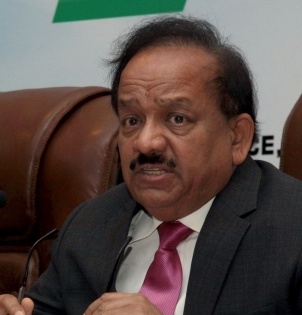Health Minister snubs Guleria's prediction on Covid peak
By IANS | Published: May 28, 2020 03:06 PM2020-05-28T15:06:57+5:302020-05-28T15:25:33+5:30
In what appears to be a snub to the prediction made by AIIMS Director Dr Randeep Gularia regarding COVID ...

Health Minister snubs Guleria's prediction on Covid peak
In what appears to be a snub to the prediction made by AIIMS Director Dr Randeep Gularia regarding COVID pandemic peak in the country, Union Health Minister Dr Harsh Vardhan on Thursday said its "difficult" to make an assumption about "future scenarios of the disease".
The Health Minister, in an exclusive interview with , said that given the heterogeneous mathematical modeling based on varied assumptions and less information available about the virus, it was extremely difficult to make accurate predictions about future scenarios of the disease.
To a query by the on when to expect the curve to flatten since AIIMS Director Guleria has said that the situation may worsen in the next two months, Harsh Vardhan clarified, "Right now, we have a steady curve. It has never shown any exponential rise."
This seemingly public disagreement with Guleria is manifestation of the government's apparent unhappiness with the AIIMS chief's comment that sparked off fear psychosis amid the COVID-19 outbreak, in India.
The Minister added, "We are now trying to bend the curve downwards. The trajectory of the outbreak is decided by a number of factors such as pathogenicity and transmissibility of virus; availability of specific treatment or vaccine; as well as collective performance of all public health interventions undertaken to contain the outbreak such as testing and early case detection, isolation, quarantine, contact-tracing, optimum care of cases and surveillance."
The Minister also said that COVID-19 is a new disease and the behaviour of this virus in the evolving outbreak is "unknown". "We have isolated the virus and our scientists and epidemiologists are studying it with the help of gene sequencing. Not much data about the virus and the disease is available at the moment," he said.
"Further as far as the issue of predictions of the further spread of the disease is concerned, let me tell you that I keep on hearing about one mathematical prediction model or the other. There are so many such models giving so many predictions round-the-clock that it is difficult to track them or justify them. But just like any mathematical model, these models are based on a number of assumptions and presumptions which may or may not match with real ground data because the data is still being generated each day and the disease has not matured across the world. Therefore, it beats me as to with so much uncertainties, whether it is possible to make accurate predictions about future scenarios of the disease," said the minister.
Delhi's All India Institute of Medical Science (AIIMS) Director Dr Guleria on May 7 had said, "National and international both experts are analysing the data. Most of them have guessed that India will most likely see the peak in June or July."
( With inputs from IANS )
Open in app